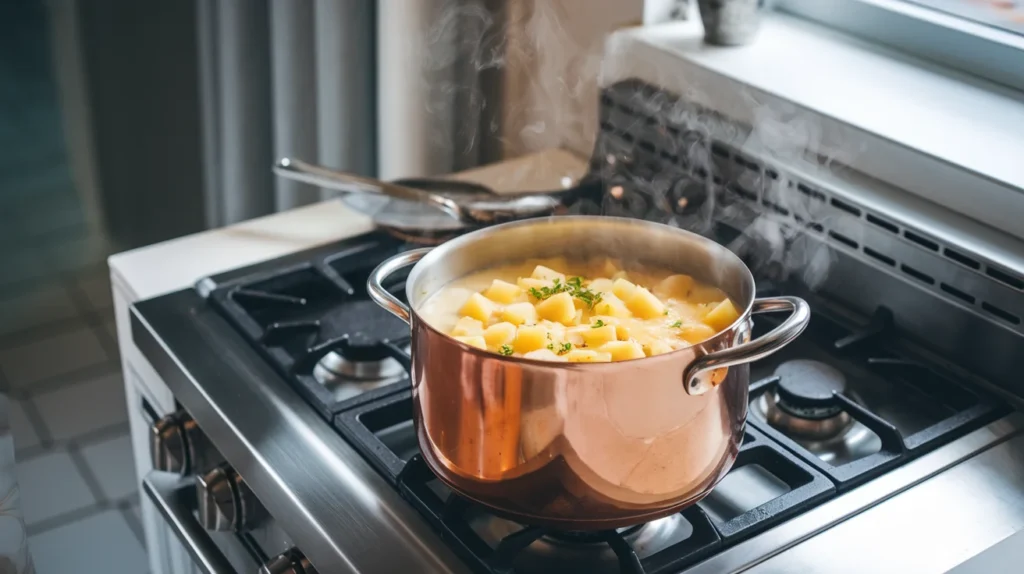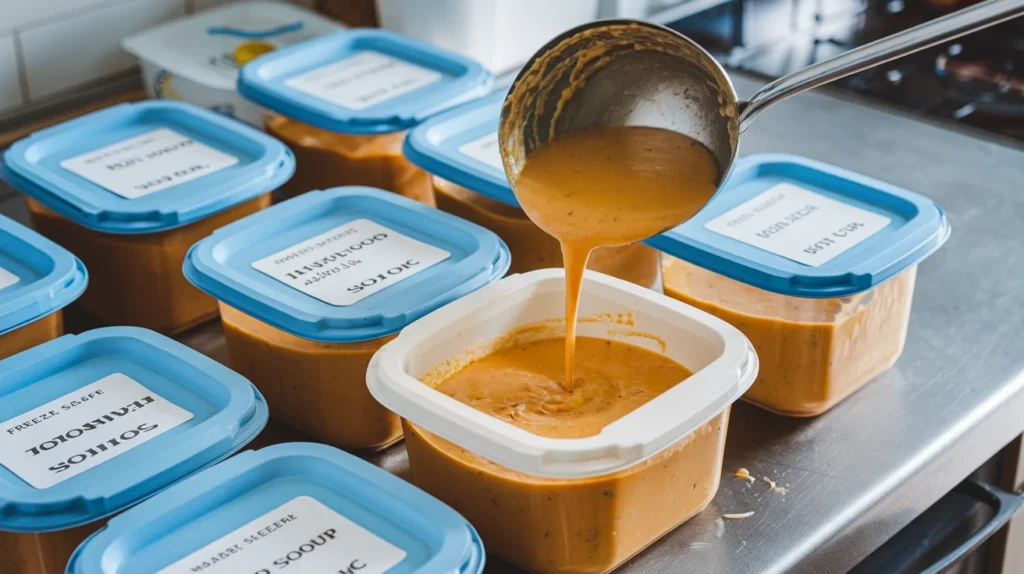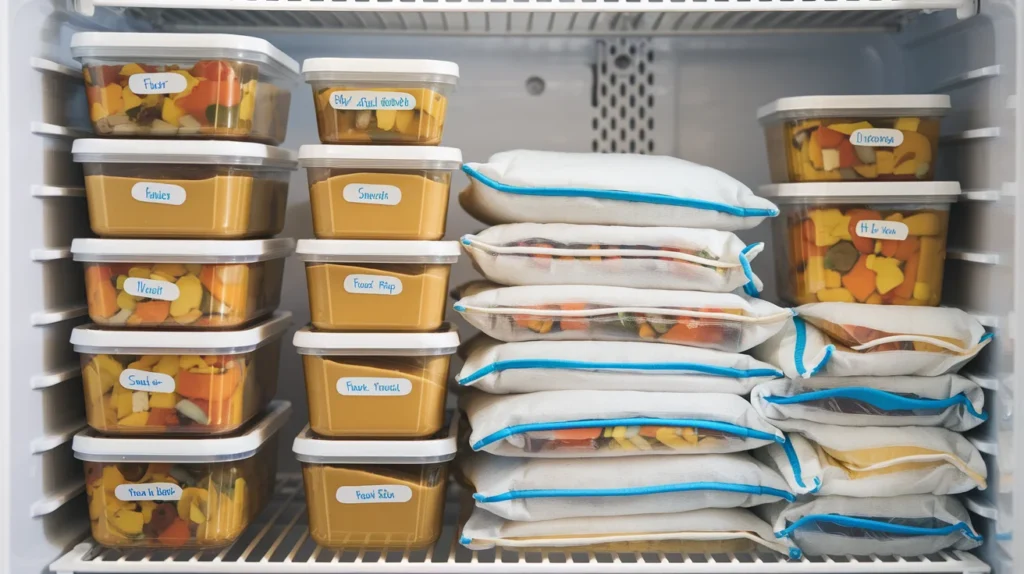Potato soup is a classic comfort food, cherished for its creamy texture and hearty ingredients that warm both the heart and stomach. Whether you’ve made a large batch for meal prep or simply have leftovers you’re not ready to part with, the question naturally arises: can you freeze potato soup? Freezing is an excellent way to preserve food, reducing waste and providing quick meal options. However, not all soups handle the freezing process equally well. Potato soup, in particular, presents some unique challenges due to its starchy base and, often, its creamy consistency. Freezing can sometimes alter its texture, making it grainy or watery when reheated. In this article, we’ll explore whether potato soup freezes well, share practical tips for freezing and reheating, and address important considerations to help you enjoy delicious potato soup, even after freezing.
Does Potato Soup Freeze Well?
Freezing potato soup can be tricky because potatoes are starchy and tend to break down during the freezing and thawing process. This can result in a grainy or watery texture, which might not be as appealing as freshly made soup. Additionally, soups with dairy, like cream or milk, are prone to separation, causing a change in consistency.
However, there are ways to improve the freezing process:
- Use waxy potatoes like Yukon Gold, which hold their texture better than starchy varieties.
- Consider freezing the soup without the dairy and adding it fresh after reheating.
- Pureeing the soup before freezing can help maintain a smoother texture.
In short, does potato soup freeze well? It depends on how the soup is prepared and frozen.
What Soups Should Not Be Frozen?

Not all soups are freezer-friendly. Here are a few types that don’t freeze well:
- Soups with a high dairy content: Cream-based soups can separate when frozen.
- Soups with starchy ingredients: Potatoes, pasta, and rice can become mushy.
- Soups with delicate vegetables: Leafy greens may lose their vibrant color and texture.
If you’re wondering, can you freeze vegetable soup with potatoes in it? The answer is yes, but expect some textural changes in the potatoes. To mitigate this, freeze vegetable soups with firmer potato varieties and avoid overcooking them before freezing.
How Long Does Potato Soup Last?
Potato soup is a versatile dish, but understanding its shelf life is crucial to ensure safety and quality. Whether stored in the refrigerator or freezer, proper handling and storage techniques can extend its usability without compromising flavor or texture.
In the Refrigerator
Homemade potato soup typically lasts 3-4 days in the refrigerator, provided it is stored correctly. The key is to transfer the soup into an airtight container to prevent exposure to air, which can accelerate spoilage. Before storing, allow the soup to cool to room temperature. This step is important as placing hot soup directly in the fridge can create condensation, which encourages the growth of bacteria and compromises the freshness of other refrigerated items.
Label the container with the preparation date to avoid confusion later. If you notice any signs of spoilage, such as an unusual smell, discoloration, or a change in texture, discard the soup immediately.
In the Freezer
For longer storage, freezing is a great option. Properly stored, potato soup can last 2-3 months in the freezer without significant loss of flavor. Use freezer-safe containers or bags to prevent freezer burn. Leave about an inch of space at the top of the container to allow for expansion as the soup freezes. Alternatively, if you’re using freezer bags, lay them flat for easier stacking and efficient freezer space utilization.
Before freezing, consider dividing the soup into single-serving portions for convenience. Always label the containers or bags with the freezing date to help you track how long they’ve been stored. When ready to use, thaw the soup overnight in the refrigerator before reheating. Avoid refreezing once it’s thawed, as this can degrade the texture and quality.
Can You Freeze Soup That Has Milk in It?

Freezing milk-based soups, such as potato soup, can be tricky due to the nature of dairy. Milk and cream have a tendency to separate during the freezing and thawing process, which can cause the soup to become watery, grainy, or curdled. This change in texture often makes milk-based soups less appealing after they’ve been frozen. However, with a few adjustments, it is possible to freeze these soups successfully. For instance, recipes like Creamy Parmesan Italian Sausage Soup, which also contain dairy, can inspire techniques such as adding fresh cream after thawing to restore creaminess and flavor.
One effective method is to blend the soup after thawing. This helps to re-emulsify the ingredients and restore a smoother consistency. If you find the soup still lacks its original creaminess, a splash of fresh cream or milk added during reheating can help revive the texture. Avoid adding milk or cream before freezing to prevent separation. With these tips, milk-based soups can remain a delightful meal option even after freezing.
Another key tip is to avoid freezing soups that contain large amounts of dairy upfront. Instead, prepare the base of the soup (without the milk or cream) and freeze it. When you’re ready to serve, thaw the soup, reheat it on the stovetop, and then stir in fresh dairy ingredients. This approach not only preserves the soup’s flavor but also avoids the unpleasant texture changes associated with freezing milk.
It’s also worth noting that some milk alternatives, like coconut milk or almond milk, freeze better than regular dairy. If you’re preparing a soup with plant-based milk, you may find that it handles freezing and thawing with fewer issues.
In summary, can you freeze soup that has milk in it? Yes, but it requires proper preparation and handling. By blending thawed soup, adding fresh dairy after reheating, or using dairy alternatives, you can enjoy milk-based soups that taste nearly as good as when they were first made.
What is the Best Container to Freeze Soup In?

Choosing the right container is critical when freezing soup, as it ensures the soup retains its flavor, texture, and freshness while avoiding issues like freezer burn. The best containers for freezing soup share a few key qualities that make them efficient and safe for long-term storage.
Key Features to Look For in a Freezer-Safe Container
- Airtight Seal
An airtight container is essential to prevent freezer burn, which can alter the flavor and texture of the soup. Proper sealing also protects the soup from absorbing odors from other frozen foods. - Freezer-Safe Material
Ensure the container is made from materials that can withstand freezing temperatures without cracking or becoming brittle. BPA-free plastic and tempered glass are excellent options. - Portion-Friendly Sizes
Using smaller containers or dividing soup into individual portions is a smart way to freeze soup. It allows you to defrost only what you need, reducing waste and maintaining the soup’s quality.
Top Options for Freezing Soup
- Plastic Freezer Bags
Plastic freezer bags are a versatile and space-saving option. Lay them flat on a baking sheet to freeze, and once frozen, stack them vertically or horizontally to maximize freezer space. Always remove excess air before sealing to prevent freezer burn. - Glass Jars
Glass jars, particularly mason jars, are a great choice for freezing liquids. However, leave about an inch of space at the top to allow for expansion as the soup freezes. Choose jars labeled “freezer-safe” to avoid cracking. - Plastic Containers
Stackable plastic containers with tight-fitting lids are durable and easy to organize. Look for those marked as freezer-safe and BPA-free to ensure food safety.
Additional Tips for Freezing Soup
- Label and Date: Always label containers with the type of soup and freezing date. This helps you track storage times and avoid keeping soup for too long.
- Avoid Overfilling: Leave some space in any container to allow for the natural expansion of liquids during freezing.
By selecting the right container and following these tips, you’ll ensure your soup stays fresh and delicious, ready to enjoy whenever you need a comforting meal.
FAQs
What potato soup freeze well?
Yes, potato soup can freeze well, but its success largely depends on how it is prepared. Potatoes tend to become grainy or mushy after freezing due to their high starch content. To improve texture, use waxy potatoes like Yukon Gold, which hold up better. Additionally, soups containing milk or cream may separate and develop a grainy consistency when thawed. To avoid this, freeze the soup without dairy and add it fresh after reheating. Pureeing the soup before freezing can also help maintain a smoother texture. With proper preparation, frozen potato soup can taste nearly as good as fresh.
How long will potato soup last in the refrigerator?
Potato soup will last 3-4 days in the refrigerator if it’s properly stored in an airtight container. This prevents air exposure, which can lead to spoilage and loss of flavor. To ensure safety and maintain freshness, allow the soup to cool to room temperature before refrigerating. Placing hot soup directly in the fridge can cause condensation, which may speed up bacterial growth and affect the soup’s texture. Always label the container with the preparation date to keep track of its shelf life, and discard the soup if you notice any unusual odors, discoloration, or changes in texture.
Can you freeze vegetable soup with potatoes in it?

Yes, you can freeze vegetable soup with potatoes, but be prepared for some changes in the texture of the potatoes. Potatoes tend to become grainy or mushy after freezing due to their high starch content. To minimize this issue, use waxy potato varieties such as Yukon Gold or red potatoes, which hold their shape and texture better than starchy types like Russets.
Before freezing, ensure the soup is cooled completely and stored in airtight, freezer-safe containers to prevent freezer burn. Divide the soup into portions for convenience and label each container with the date to keep track of storage time. While frozen vegetable soup with potatoes remains safe to eat, it’s important to note that the texture of the potatoes may not be identical to when the soup was freshly prepared.
Conclusion
Freezing potato soup is a practical way to reduce waste and prepare for busy days, but it requires careful planning to maintain its flavor and texture. The unique characteristics of potato soup—such as the starchy nature of potatoes and the frequent use of dairy—can pose challenges when frozen. Potatoes often become grainy or mushy after freezing, and milk-based soups may separate, leading to a less appealing texture. However, with the right techniques, these issues can be minimized.
For the best results, use waxy potatoes like Yukon Gold, which hold their structure better than starchy varieties. If your soup contains dairy, consider freezing it without milk or cream and adding these ingredients fresh when reheating. This simple adjustment can help retain the soup’s creamy consistency. Additionally, pureeing the soup before freezing can improve its texture after thawing.
Choose airtight, freezer-safe containers such as plastic freezer bags, glass jars, or BPA-free plastic containers to prevent freezer burn and preserve freshness. Label and date the containers to ensure you use them within the recommended storage period—3-4 days in the fridge or up to 2-3 months in the freezer.
With proper preparation and storage, frozen potato soup can retain its comforting taste and be ready to enjoy whenever needed. Follow these tips to savor your soup just as much after freezing as you did when it was freshly made!

